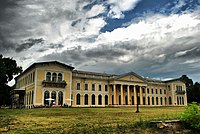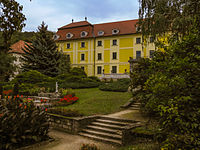Pest County
Pest County
Pest vármegye | |
|---|---|
|
Clockwise, from top: the Börzsöny Mountain in Nagybörzsöny village, landscape of Kemence, and landscape of Vác | |
 Pest County within Hungary | |
| Country | |
| Region | Central Hungary |
| County seat | Budapest |
| Districts | 18 districts |
| Government | |
| • President of the General Assembly | István Szabó (Fidesz-KDNP) |
| Area | |
| • Total | 6,393.14 km2 (2,468.41 sq mi) |
| • Rank | 3rd in Hungary |
| Population (2023) | |
| • Total | 1,339,000 |
| • Rank | 1st in Hungary |
| • Density | 191.8/km2 (497/sq mi) |
| GDP | |
| • Total | HUF 3,607 billion €11.586 billion (2016) |
| Postal code | 20xx – 23xx, 2440, 2461, 260x – 263x, 2680 – 2683, 27xx |
| Area code(s) | (+36) 23, 24, 26, 27, 28, 29, 53 |
| ISO 3166 code | HU-PE |
| Website | www |
Pest (Hungarian: Pest vármegye, pronounced [ˈpɛʃt]; German: Komitat Pest) is a county (vármegye) in central Hungary. It covers an area of 6,393.14 square kilometres (2,468.41 sq mi), and has a population of 1,339,090 (2023). It surrounds the national capital Budapest and the majority of the county's population (65.2%/790,995 in 2009) live in the suburbs of Budapest. It shares borders with Slovakia and the Hungarian counties Nógrád, Heves, Jász-Nagykun-Szolnok, Bács-Kiskun, Fejér, and Komárom-Esztergom. The River Danube flows through the county. The capital of Pest County is Budapest, although Budapest is not part of Pest County. Starting 2018, they also constitute different NUTS:HU level 2 regions, as previously Pest County has lost catch-up aids from the European Union because of the high development of Budapest.
History
[edit]The present county Pest was formed after World War II, when the former county Pest-Pilis-Solt-Kiskun was split in two parts (the other part is within present-day Bács-Kiskun). Pest County also existed in the early days of the medieval Kingdom of Hungary (11th century). Its territory comprised approximately the north-eastern part of present Pest County. It was combined with adjacent Pilis county before the 15th century. More information can be found at the entry of former Pest-Pilis-Solt-Kiskun county.
This section needs expansion. You can help by adding to it. (June 2008) |
Demographics
[edit]Religion in Pest County (2022 census – of those who declared their religion (58.6%))
In 2015, it had a population of 1,226,115 and the population density was 192/km2.
| Year | Pop. | ±% |
|---|---|---|
| 1870 | 330,089 | — |
| 1880 | 353,851 | +7.2% |
| 1890 | 395,142 | +11.7% |
| 1900 | 450,136 | +13.9% |
| 1910 | 524,320 | +16.5% |
| 1920 | 571,753 | +9.0% |
| 1930 | 633,257 | +10.8% |
| 1941 | 682,696 | +7.8% |
| 1949 | 686,953 | +0.6% |
| 1960 | 781,505 | +13.8% |
| 1970 | 878,644 | +12.4% |
| 1980 | 973,830 | +10.8% |
| 1990 | 949,842 | −2.5% |
| 2001 | 1,083,877 | +14.1% |
| 2011 | 1,217,476 | +12.3% |
| 2021 | 1,333,533 | +9.5% |
| Source: [2][3] | ||
Ethnicity
[edit]Besides the Hungarian majority, the main minorities are the Germans (approx. 25,000), Roma (20,000), Slovaks (6,000), Romanians (4,000) and Serbs (1,500).
Total population (2011 census): 1,217,476
Ethnic groups (2011 census):[4]
Identified themselves: 1,090,882 persons:
- Hungarians: 1,024,768 (93.94%)
- Germans: 24,994 (2.29%)
- Romani: 20,065 (1.84%)
- Others and indefinable: 21,055 (1.93%)
Approx. 178,000 persons in Pest County did not declare their ethnic group at the 2011 census.
Religion
[edit]Religious adherence in the county according to 2011 census:[5]
- Catholic – 445,106 (Roman Catholic – 435,717; Greek Catholic – 9,235);
- Reformed – 134,848;
- Evangelical – 32,564;
- Orthodox – 1,796;
- Judaism – 947;
- Other religions – 26,485;
- Non-religious – 200,430;
- Atheism – 19,869;
- Undeclared – 355,431.
Economy
[edit]The Gross domestic product (GDP) of the county was 13.8 billion euros in 2018, accounting for 10.3% of Hungary's economic output. GDP per capita adjusted for purchasing power was 17,000 euros or 56% of the EU27 average in the same year. The GDP per employee was 69% of the EU average.[6]
Regional structure
[edit]
| № | English and Hungarian names |
Area (km2) |
Population (2011) |
Density (pop./km2) |
Seat | № of municipalities |
| 1 | Aszód District Aszódi járás |
298.37 | 37,472 | 126 | Aszód | 11 |
| 2 | Budakeszi District Budakeszi járás |
288.95 | 83,670 | 290 | Budakeszi | 12 |
| 3 | Cegléd District Ceglédi járás |
886.30 | 88,952 | 100 | Cegléd | 12 |
| 4 | Dabas District Dabasi járás |
614.23 | 48,289 | 79 | Dabas | 11 |
| 5 | Dunakeszi District Dunakeszi járás |
103.08 | 78,634 | 763 | Dunakeszi | 4 |
| 6 | Érd District Érdi járás |
184.29 | 116,510 | 632 | Érd | 7 |
| 7 | Gödöllő District Gödöllői járás |
449.66 | 139,826 | 311 | Gödöllő | 15 |
| 8 | Gyál District Gyáli járás |
170.99 | 40,853 | 239 | Gyál | 4 |
| 9 | Monor District Monori járás |
329.81 | 64,016 | 194 | Monor | 12 |
| 10 | Nagykáta District Nagykátai járás |
710.12 | 73,959 | 104 | Nagykáta | 15 |
| 11 | Nagykőrös District Nagykőrösi járás |
349.25 | 27,977 | 80 | Nagykőrös | 3 |
| 12 | Pilisvörösvár District Pilisvörösvári járás |
130.81 | 53,201 | 407 | Pilisvörösvár | 9 |
| 13 | Ráckeve District Ráckevei járás |
417.05 | 35,732 | 86 | Ráckeve | 11 |
| 14 | Szentendre District Szentendrei járás |
326.58 | 77,802 | 238 | Szentendre | 13 |
| 15 | Szigetszentmiklós District Szigetszentmiklósi járás |
211.28 | 110,448 | 523 | Szigetszentmiklós | 9 |
| 16 | Szob District Szobi járás |
438.32 | 24,875 | 57 | Szob | 17 |
| 17 | Vác District Váci járás |
362.19 | 68,234 | 188 | Vác | 18 |
| 18 | Vecsés District Vecsési járás |
119.74 | 47,026 | 393 | Vecsés | 4 |
| Pest County | 6,393.14 | 1,217,476 | 192 | Budapest | 187 | |
|---|---|---|---|---|---|---|
Politics
[edit]The Pest County Council, elected at the 2024 local government elections,[7] is made up of 44 counselors,[8] with the following party composition:
| Party | Seats | Current County Assembly | ||||||||||||||||||||||||
|---|---|---|---|---|---|---|---|---|---|---|---|---|---|---|---|---|---|---|---|---|---|---|---|---|---|---|
| Fidesz-KDNP | 21 | |||||||||||||||||||||||||
| Momentum Movement | 10 | |||||||||||||||||||||||||
| Our Homeland Movement | 8 | |||||||||||||||||||||||||
| Democratic Coalition | 7 | |||||||||||||||||||||||||
Presidents of the General Assembly
[edit]| List of presidents since 1990[9] | |
|---|---|
| István Szabó (Fidesz-KDNP) | 2014– |
Municipalities
[edit]Pest County has 1 urban county, 47 towns, 17 large villages and 122 villages.
- City with county rights
(ordered by population, as of 2011 census)
- Érd (63,631)
- Towns
- Dunakeszi (40,545)
- Cegléd (36,645)
- Szigetszentmiklós (34,708)
- Vác (33,831)
- Gödöllő (32,522)
- Budaörs (26,757)
- Szentendre (25,310)
- Nagykőrös (24,134)
- Gyál (23,338)
- Dunaharaszti (20,473)
- Vecsés (20,088)
- Fót (19,068)
- Százhalombatta (17,952)
- Monor (17,626)
- Göd (17,476)
- Szigethalom (16,886)
- Pomáz (16,622)
- Dabas (16,386)
- Gyömrő (16,250)
- Veresegyház (15,998)
- Pécel (15,168)
- Abony (14,916)
- Pilisvörösvár (13,667)
- Budakeszi (13,502)
- Törökbálint (12,841)
- Biatorbágy (12,484)
- Nagykáta (12,467)
- Albertirsa (12,016)
- Kistarcsa (11,953)
- Maglód (11,738)
- Pilis (11,568)
- Üllő (11,425)
- Isaszeg (11,152)
- Tököl (10,851)
- Budakalász (10,619)
- Kerepes (10,068)
- Ráckeve (9,755)
- Halásztelek (9,200)
- Diósd (9,056)
- Ócsa (8,985)
- Piliscsaba (8,472)
- Sülysáp (8,195)
- Tura (7,774)
- Dunavarsány (7,363)
- Őrbottyán (7,102)
- Aszód (6,258)
- Tápiószele (5,914)
- Zsámbék (5,174)
- Örkény (4,730)
- Nagymaros (4,679)
- Szob (2,794)
- Újhartyán (2,685)
- Visegrád (1,718)
- Villages
- Acsa
- Alsónémedi

- Apaj
- Áporka
- Bag

- Bénye
- Bernecebaráti
- Budajenő
- Bugyi

- Ceglédbercel
- Csemő
- Csévharaszt
- Csobánka
- Csomád
- Csömör

- Csörög
- Csővár
- Dánszentmiklós
- Dány
- Délegyháza
- Domony
- Dömsöd

- Dunabogdány
- Ecser

- Erdőkertes
- Farmos
- Felsőpakony
- Galgagyörk
- Galgahévíz
- Galgamácsa
- Gomba
- Herceghalom
- Hernád
- Hévízgyörk
- Iklad
- Inárcs
- Ipolydamásd
- Ipolytölgyes
- Jászkarajenő
- Kakucs
- Kartal

- Káva
- Kemence
- Kiskunlacháza

- Kismaros
- Kisnémedi
- Kisoroszi
- Kocsér
- Kosd
- Kóka
- Kőröstetétlen
- Kóspallag
- Leányfalu

- Letkés
- Lórév
- Majosháza
- Makád
- Márianosztra
- Mende
- Mikebuda
- Mogyoród

- Monorierdő
- Nagybörzsöny
- Nagykovácsi

- Nagytarcsa
- Nyáregyháza
- Nyársapát
- Pánd
- Páty
- Penc
- Perbál
- Perőcsény
- Péteri
- Pilisborosjenő
- Pilisjászfalu
- Pilisszántó
- Pilisszentiván
- Pilisszentkereszt
- Pilisszentlászló
- Pócsmegyer
- Pusztavacs
- Pusztazámor
- Püspökhatvan
- Püspökszilágy
- Rád
- Remeteszőlős
- Solymár

- Sóskút
- Szada
- Szentlőrinckáta
- Szentmártonkáta
- Szigetbecse
- Szigetcsép
- Szigetmonostor
- Szigetszentmárton
- Szigetújfalu
- Szokolya
- Sződ
- Sződliget
- Tahitótfalu
- Taksony

- Tatárszentgyörgy
- Táborfalva
- Tápióbicske
- Tápiógyörgye
- Tápióság
- Tápiószecső

- Tápiószentmárton

- Tápiószőlős
- Tárnok

- Telki
- Tésa
- Tinnye
- Tóalmás
- Tök
- Törtel
- Újlengyel
- Újszilvás
- Úri
- Üröm
- Valkó

- Vasad
- Vácduka
- Vácegres
- Váchartyán
- Váckisújfalu
- Vácrátót
- Vácszentlászló
- Vámosmikola
- Verőce
- Verseg
- Zebegény
- Zsámbok
![]() municipalities are large villages.
municipalities are large villages.
Gallery
[edit]-
View of Szentendre
-
Citadel of Visegrád
-
Cathedral in Vác
-
Károlyi Mansion, Fót
-
Mailáth Mansion in Törökbálint
-
Choral Castle, Pomáz
International relations
[edit]Pest County has a partnership relationship with:[10]
|
|
References
[edit]- ^ Regions and Cities > Regional Statistics > Regional Economy > Regional GDP per Capita, OECD.Stats. Accessed on 16 November 2018.
- ^ népesség.com, "Pest megye népessége 1870-2015"
- ^ "Census database - Hungarian Central Statistical Office".
- ^ 1.1.6. A népesség anyanyelv, nemzetiség és nemek szerint – Frissítve: 2013.04.17.; Hungarian Central Statistical Office (in Hungarian)
- ^ 2011. ÉVI NÉPSZÁMLÁLÁS, 3. Területi adatok, 3.14 Pest megye, (in Hungarian) [1]
- ^ "Regional GDP per capita ranged from 30% to 263% of the EU average in 2018". Eurostat.
- ^ "Nemzeti Választási Iroda - Helyi önkormányzati választások". vtr.valasztas.hu (in Hungarian). Retrieved 2024-10-26.
- ^ "Megyei közgyűlés tagjai 2019-2024 (Pest megye)". valasztas.hu. Retrieved 2019-10-29.
- ^ Önkormányzati választások eredményei (in Hungarian)
- ^ Külkapcsolatok (Pest megye)
External links
[edit]- Official website
 in Hungarian and English
in Hungarian and English















